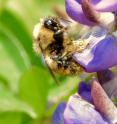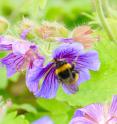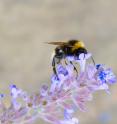Climate change: Compressing the bumblebee range
Related images
(click to enlarge)
While the geographic ranges of many animals are expanding northward in response to climate change, those of North American and European bumblebee species are shrinking, a new study shows. These insects are failing to migrate northward, the study reveals, and in their southern territories, their ranges are compressing -- with range losses up to 300 kilometers in both North America and Europe. "This paper is important because it reinforces the understanding that species will not all be able to shift their ranges in order to adapt to a changing climate," said Dr. Sacha Vignieri, an associate editor for the journal Science.
The results, published in the 10 July issue of Science, illustrate the importance of testing how changes in climate affect bumblebee species and the need to conserve these cherished crop pollinators globally to prevent their extinction.
The impacts of climate change have been observed in many animal species, particularly the trend for species to shift their geographical ranges toward the polar region or higher elevations in response to changes in climatic conditions.
To investigate bumblebees' responses to climate change, Jeremy Kerr, a professor in the biology department at the University of Ottawa, and colleagues first generated a database of geotagged observations of 67 European and North American bumblebee species from 1901 to 2010.
They compared changes in individual bee species' northward movements in recent decades, against baseline bumblebee activity from 1901 to 1974, when the climate was cooler. To their surprise, bumblebees in recent, warmer decades didn't shift their ranges north. Simultaneously, bumblebee populations disappeared from the southernmost and hottest parts of their ranges, with bumblebees in those locations moving to higher, cooler elevations, where possible.
"Global warming has trapped bumblebee species in a kind of climate vise -- the result is dramatic losses of bumblebee species from the hottest areas across two continents," said lead author Kerr. "For species that evolved under cool conditions, like bumblebees, global warming might be the kind of threat that causes many of them to disappear for good."
"Unlike so many other species, bumblebees generally haven't expanded into more northern areas," he continued. "We may need to help these species establish new colonies to the north and at continental scales."
The researchers also evaluated the roles of factors besides climate change, like land use and pesticide application, in causing bumblebee range losses -- finding no significant correlation. "Bumblebee disappearances from warm, southern areas are just as likely when there is no pesticide use and little agriculture," said Kerr. "But we know that increasingly frequent weather extremes, like heat waves, can hit bumblebee species hard, and climate change poses threats that are already being felt."
Source: American Association for the Advancement of Science
Articles on the same topic
- Buzz the alarm: Climate change puts squeeze on bumblebeesThu, 9 Jul 2015, 20:37:20 UTC
- Bumblebees disappearing as climate warms in North America and Europe, study findsThu, 9 Jul 2015, 20:37:09 UTC
Other sources
- Rising temperatures due to climate change are latest threat to bumblebeesfrom LA Times - ScienceThu, 9 Jul 2015, 22:30:15 UTC
- Buzzkill: global warming shrinks range of pollinating bumblebeesfrom Reuters:ScienceThu, 9 Jul 2015, 22:20:07 UTC
- Buzz the alarm: Climate change puts squeeze on bumblebeesfrom Science DailyThu, 9 Jul 2015, 20:30:22 UTC
- Warming 'squeezing out' bumblebeesfrom BBC News: Science & NatureThu, 9 Jul 2015, 19:30:16 UTC
- Study: American, European Bumblebees Feeling Climate Stingfrom NY Times ScienceThu, 9 Jul 2015, 19:30:08 UTC
- Climate Change Is Shrinking Where Bumblebees Range, Researchers Findfrom NY Times ScienceThu, 9 Jul 2015, 19:30:07 UTC
- Bumblebees feeling the sting of climate changefrom CBSNews - ScienceThu, 9 Jul 2015, 19:00:23 UTC
- Climate change is killing off bumblebees: studyfrom CBC: Technology & ScienceThu, 9 Jul 2015, 18:40:06 UTC
- Bumblebees Are Being Bumped Off by Climate Changefrom MSNBC: ScienceThu, 9 Jul 2015, 18:31:13 UTC
- Climate change crushes bee populationsfrom News @ NatureThu, 9 Jul 2015, 18:31:11 UTC
- Climate Change Shrinks the Bumblebee's Range | Videofrom Live ScienceThu, 9 Jul 2015, 18:31:09 UTC
- In Photos: The World's Most Efficient Pollinatorsfrom Live ScienceThu, 9 Jul 2015, 18:31:07 UTC
- Buzz the alarm: Climate change puts squeeze on bumblebeesfrom PhysorgThu, 9 Jul 2015, 18:30:52 UTC
- Study: American, European bumblebees feeling climate stingfrom AP ScienceThu, 9 Jul 2015, 18:30:36 UTC
- Bumblebee territory shrinking under climate changefrom Sciencenews.orgThu, 9 Jul 2015, 18:10:19 UTC
- Climate change is killing off bumblebeesfrom CBC: Technology & ScienceThu, 9 Jul 2015, 18:10:17 UTC


